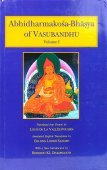Mahavibhasha, Mahāvibhāṣā, Maha-vibhasha: 7 definitions
Introduction:
Mahavibhasha means something in Buddhism, Pali, Hinduism, Sanskrit. If you want to know the exact meaning, history, etymology or English translation of this term then check out the descriptions on this page. Add your comment or reference to a book if you want to contribute to this summary article.
The Sanskrit term Mahāvibhāṣā can be transliterated into English as Mahavibhasa or Mahavibhasha, using the IAST transliteration scheme (?).
In Hinduism
Vyakarana (Sanskrit grammar)
Source: Wikisource: A dictionary of Sanskrit grammarMahāvibhāṣā (महाविभाषा).—A rule laying down an option for several rules in a topic by being present in every rule: cf. महाविभाषया वाक्यमपि (mahāvibhāṣayā vākyamapi). विभाषा (vibhāṣā) (P.II.1.11) and समर्थानां प्रथमाद्वा (samarthānāṃ prathamādvā) (P. IV.1.82) are some of the rules of this kind.

Vyakarana (व्याकरण, vyākaraṇa) refers to Sanskrit grammar and represents one of the six additional sciences (vedanga) to be studied along with the Vedas. Vyakarana concerns itself with the rules of Sanskrit grammar and linguistic analysis in order to establish the correct context of words and sentences.
General definition (in Hinduism)
Source: Digital Library of India: Nyāya-VaiśeṣikaThe Mahāvibhāṣā (or Jñānaprasthāna) is philosophical literature composed by Vasumitra under the patronage of King Kaniṣka (ca. 78—102 A.D.).
Source: Oxford Reference: Indian PhilosophyA great treatise whose name means the ‘Great Book of Alternatives’ or ‘Great Book of Options’, compiled probably during the 3rd century ce in Gandhāra under the patronage of King Kaniṣka II. It is traditionally believed to have been composed at the Council of Kaniṣka, held in the reign of Kaniṣka I, but this is unlikely since the text contains a specific reference to the ‘former king Kaniṣka’. Moreover, inscriptions and recent finds in Afghanistan suggest that it is unlikely that Sanskrit was used by any Buddhists before the 2nd century ce.
The treatise is a commentary on a fundamental work of Abhidharma.the Jñānaprasthāna (Basis of Knowledge) of Katyāyanaputra, a Sarvāstivādin philosopher. Also known as the Vibhāṣā, the text is an encyclopedia of the views of the Vaibhāṣika school and records the views of distinguished teachers of different schools on technical points of doctrine.
In Buddhism
General definition (in Buddhism)
Source: WikiPedia: BuddhismThe Abhidharma Mahāvibhāṣa Śāstra is an ancient Buddhist text. It is thought to have been authored around 150 CE.
It contains a huge array of material. This includes the discussion of basically every doctrinal issue of the day, as presented by not only non-Sarvāstivāda views, such as the Vaibhajyavāda, Pudgalavāda, Mahāsāṃghika, and others; but also non-Buddhist systems, such as the Saṃkhya, the Vaiśeṣika, and others; and finally of the Sarvāstivāda itself, as represented by its various learned and venerable leaders.
Languages of India and abroad
Sanskrit dictionary
Source: DDSA: The practical Sanskrit-English dictionaryMahāvibhāṣā (महाविभाषा).—a rule giving a general option or alternative; इति महाविभाषया साधुः (iti mahāvibhāṣayā sādhuḥ).
Mahāvibhāṣā is a Sanskrit compound consisting of the terms mahā and vibhāṣā (विभाषा).
Source: Cologne Digital Sanskrit Dictionaries: Shabda-Sagara Sanskrit-English DictionaryMahāvibhāṣā (महाविभाषा).—f.
(-ṣā) A rule containing a general alternative.
Source: Cologne Digital Sanskrit Dictionaries: Monier-Williams Sanskrit-English DictionaryMahāvibhāṣā (महाविभाषा):—[=mahā-vibhāṣā] [from mahā > mah] f. a general alternative, a rule containing a gen° alt°, [Monier-Williams’ Sanskrit-English Dictionary]
Sanskrit, also spelled संस्कृतम् (saṃskṛtam), is an ancient language of India commonly seen as the grandmother of the Indo-European language family (even English!). Closely allied with Prakrit and Pali, Sanskrit is more exhaustive in both grammar and terms and has the most extensive collection of literature in the world, greatly surpassing its sister-languages Greek and Latin.
See also (Relevant definitions)
Partial matches: Maha, Vibhasha.
Starts with: Mahavibhashashastra.
Full-text: Mahavibhashashastra, Kleshavasana, Ashvaghosha, Punyakriyavastu, Vibhasha, Jnanaprasthana, Saivala, Vaibhashika, Anyatara, Anagamin, Dhanapala.
Relevant text
Search found 5 books and stories containing Mahavibhasha, Mahā-vibhāṣā, Maha-vibhasa, Maha-vibhasha, Mahāvibhāṣā, Mahavibhasa; (plurals include: Mahavibhashas, vibhāṣās, vibhasas, vibhashas, Mahāvibhāṣās, Mahavibhasas). You can also click to the full overview containing English textual excerpts. Below are direct links for the most relevant articles:
Maha Prajnaparamita Sastra (by Gelongma Karma Migme Chödrön)
Appendix 2 - Definition of the srotaāpattiphala (the fruit of entry into the stream) < [Chapter XLIX - The Four Conditions]
Conditions note (1): The system in the canonical sūtras < [Part 1 - Understanding the Conditions (pratyaya)]
Note (3). The ten grounds shared by adepts of the three vehicles < [Chapter XX - (2nd series): Setting out on the Mahāyāna]
Buddhacarita (by Charles Willemen)
A History of Indian Philosophy Volume 1 (by Surendranath Dasgupta)
Part 10 - The Schools of Theravada Buddhism < [Chapter V - Buddhist Philosophy]
Reverberations of Dharmakirti’s Philosophy (by Birgit Kellner)
A Dictionary Of Chinese Buddhist Terms (by William Edward Soothill)
Related products
